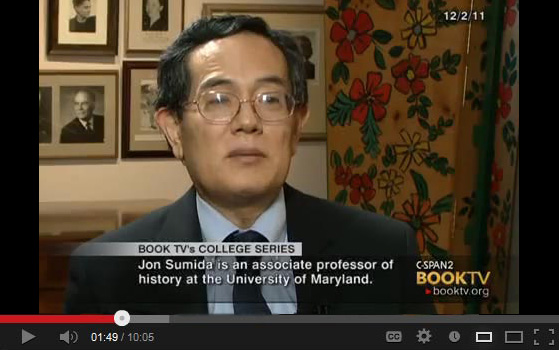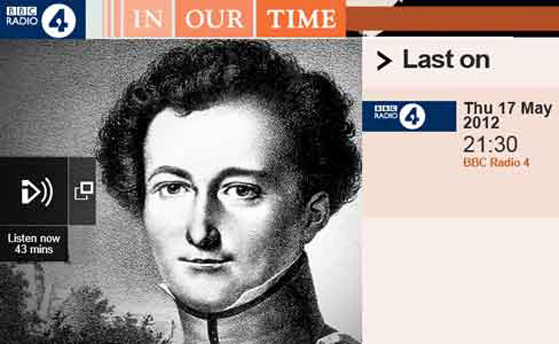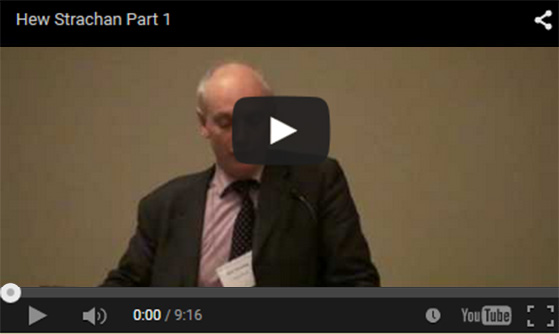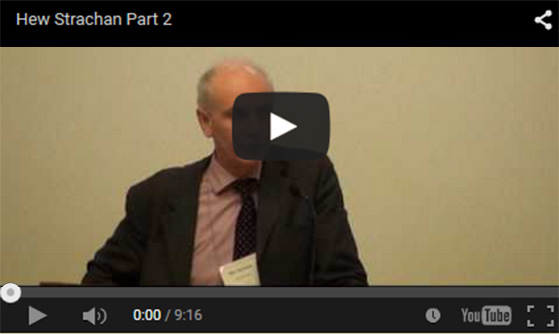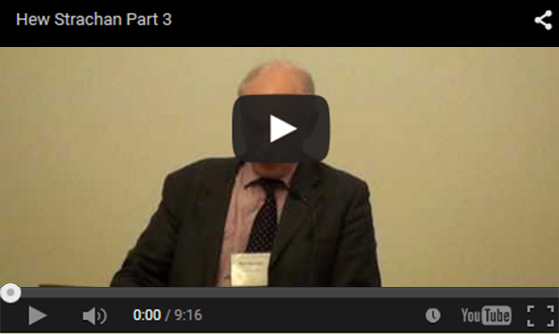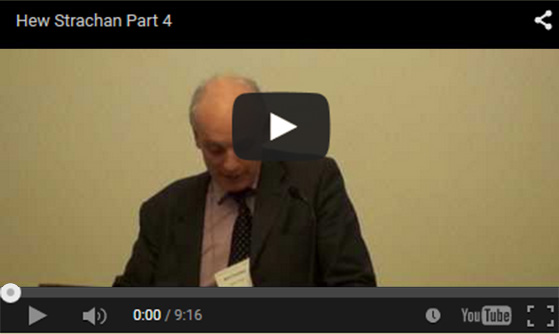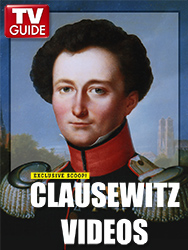
This "Clausewitz Videos" section of Clausewitz.com lists, discusses, presents, or links to fifty+ videos making significant or otherwise useful reference to the work or ideas of the Prussian military philosopher General Carl von Clausewitz. Some of these have considerable educational value themselves. Others, unfortunately, contribute to our understanding primarily by demonstrating common misunderstandings of his ideas. Others are merely amusing—potential lead-ins or illustrations for more serious discussions. They are grouped under the various headings shown in the yellow Table of Contents box below.
|
THIS PAGE Academic Lectures and Interviews by prominent Clausewitz scholars — • — |
|
ADDITIONAL PAGES This is a guide to some pop-culture references to Clausewitz that might be useful bits for lectures or presentations—especially if you are looking to fulfill the U.S. War Colleges' mandatory "Monty Python video requirement" for discussions on strategic theory. |
Clausewitz at the Pentagon, 2015 In 2015, then-Under Secretary of Defense for Personnel and Readiness Brad R. Carson invited several prominent Clausewitz scholars to give a series of lectures, which culminated in a panel discussion involving Carsion and six of the series participants. We have 4 full-length classes by individual speakers and the full panel discussion. |
|
Clausewitz's writing were not intended to become doctrine, but they are certainly relevant to doctrine. Explaining the relevance can be done well or poorly. |
● SAY CLAUSEWITZ'S NAME CORRECTLY. It will gratify some people and astound the rest.
KLOWZ-uh-vitz
BTW: Use the 'von' (pronounced 'fun') only with the full name (i.e., "Carl von Clausewitz"). Do not use the von with his last name alone (e.g., don't say "We find value in von Clausewitz's theories"). Simply say you find value in Clausewitz's ideas.
LECTURES & INTERVIEWS with SCHOLARS
Return to Main Videos Page
● In the first Annual Lecture since the death of Sir Michael Howard, Professor Sir Hew Strachan, Wardlaw Professor of International Relations at the University of St Andrews, discusses Michael Howard's interpretation of the Prussian general and military theorist, Carl von Clausewitz.
● Olivia A. Garard. 28 MAY 2021. Former Marine captain speaking to the USMC's Krulak Center about her newly released book from Marine Corps University Press, An Annotated Guide to Tactics: Carl von Clausewitz’s “Theory of the Combat.” (PDF) Kindle at Amazon. See PODCAST at Spotify. Garard has a BA from Princeton and an MA in war studies from King’s College London UK. Clausewitz tends to bind her motley thoughts together.
● Dec 11, 2011. Interview with University of Maryland History Professor Jon Sumida about his important book, Decoding Clausewitz: A New Approach to On War (University Press of Kansas, 2008). The YouTube version of this interesting video ends rather abruptly before the interview concludes. The full video can be watched at https://www.c-span.org/video/?303077-2/decoding-clausewitz or by clicking the picture below. See also Sumida's short article "The Clausewitz Problem," Army History, Fall 2009, pp.17-21—a short, well-crafted, and useful précis of Sumida's important, sometimes controversial arguments.
● Historian and journalist Vanya Eftimova Bellinger, Professor of Clausewitz Studies, U.S. Army War College.
See her important biography, Marie von Clausewitz: The Woman Behind the Making of On War (Oxford University Press, 2015).
Interview with Vanya Eftimova Bellinger, "Clausewitz: 19th century wisdom, 21st century relevance of On War." Feb 15, 2018.
Lecture in AWC's Bliss Hall, 30 Aug 2017: "Clausewitz: Challenges and Context.
● Donald Stoker | Clausewitz: His Life and Work. (YouTube video) Naval War College at NPS Professor Donald Stoker, speaking at Google on 17 NOV 2014, on Clausewitz the soldier behind the theorist. Stoker is the author of Clausewitz: His Life and Work (New York: Oxford University Press, 2014), ISBN: 0199357943. (YouTube video.) The Talks at Google program brings authors, innovators, scientists, actors, actresses, artists, filmmakers, musicians, and speakers of all kinds to Google for talks centering on their work.
● Dr. Antulio J. ("Tony") Echevarria II, Director of Research, US Army War College, presents "Clausewitz and Contemporary War," as part of the Perspectives in Military History Lecture Series. Tony is one of the leading American scholars on Clausewitz. Published 25 MAR 2010.
● "Clausewitz Theory of War, Background and Trinity." Dr. Tony Echevarria, Army War College faculty, 29 AUG 2017. Carlisle Barracks Wil Washcoe Hall.
• PANEL DISCUSSION (PODCAST) •
● BBC Radio 4, "In Our Time," Thursday 17 May 2012 (21:30). Radio-host Melvyn Bragg and his guests Saul David (Professor of War Studies at the University of Buckingham), Hew Strachan (Chichele Professor of the History of War at the University of Oxford), and Beatrice Heuser (Professor of International Relations at the University of Reading), discuss On War, a treatise on the theory and practice of warfare written by the Prussian soldier and intellectual Carl von Clausewitz. First published in 1832, Clausewitz's magnum opus is commonly regarded as the most important book about military theory ever written. Informed by its author's experience of fighting against the mighty armies of Napoleon, the work looks not just at the practicalities of warfare, but offers a subtle philosophical analysis of the nature of war and its relationship with politics. Notions such as the Clausewitzian Trinity have had an enormous effect on later military leaders. But its influence is felt today not just on the battlefield but also in politics and business.
Click on the image above to go to the podcast's website.
● Hew Strachan: "Clausewitz and the First World War," Parts 1 through 5. (These videos—16 minutes—each are daisy-chained together, so you can watch them in sequence. Unfortunately, Part 5 appears to break off suddenly in the middle and the link to Part 6 is broken and we cannot locate it.) Scottish professor Hew Strachan is one of the strongest voices in the modern debate over Clausewitz—and largely positive in his views, though he is sometimes somewhat mysteriously ambivalent. This is the 2010 George C. Marshall Lecture in Military History. The History News Network recorded this video of Strachan (Chichele Professor of the History of War at Oxford University) speaking at the annual meeting of the Organization of American Historians on April 9, 2010 in Washington, D.C. See also the written article: Hew Strachan, "Clausewitz and the First World War," Journal of Military History, Vol.75, Issue 2 (April 2011), pp.367-391. That article is posted to The Clausewitz Homepage with the permission of The Journal of Military History.
● The Great Courses, "Masters of War: History's Greatest Strategic Thinkers." See lectures 10: "Clausewitz's On War" and 11: "Jomini and Clausewitz through the Ages." By Professor Andrew R. Wilson, formerly of Harvard and now at the U.S. Naval War College. (See course listing.) This is pretty good! We were alerted to this video by a prominent Clausewitz scholar who was critical of several features—especially Wilson's treatment of Clausewitz's trinity. We agree on that point and would quibble with Wilson on several others. Nonetheless, this is one of the best general treatments of Clausewitz on video that we've seen. No longer posted to YouTube—try the "Great Courses" site.
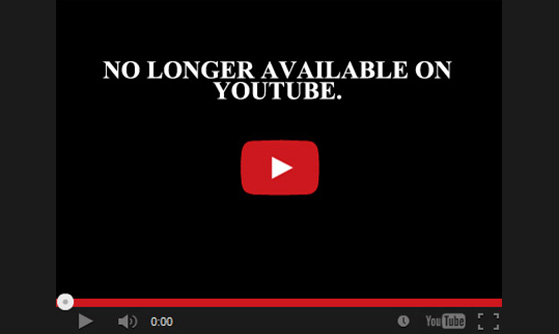
● Professor Alex Danchev looks at Clausewitz as one of the great thinkers in politics. Covers the contents of On War in 60 seconds. Solid but inevitably a bit thin.
